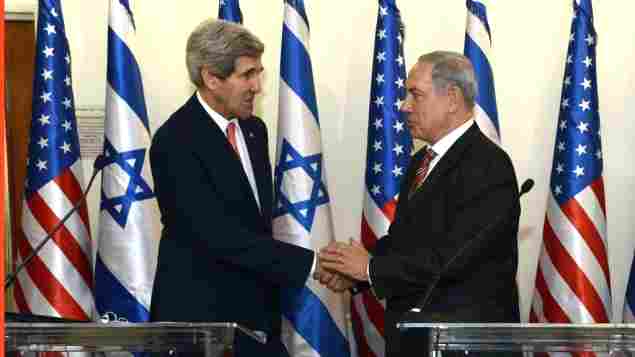Israel has mounted a serious diplomatic and public relations campaign to shape the contours of a future comprehensive agreement on Iran’s controversial nuclear program.
Having lost the battle to toughen the interim accord — which was signed on Nov. 24 in Geneva and is widely seen as a step in the right direction to resolve one of the gravest political problems in the Middle East — Israel is using all its resources to ensure that its interests are met before the world’s major powers and Iran sign a final deal.
Staking out a maximalist position, Israeli Prime Minister Benjamin Netanyahu bitterly opposed the six-month interim agreement, which is expected to be formally implemented within the next few weeks, once follow-up technical talks have been completed.
Under the terms of the interim accord, Iran will freeze much of its militarized nuclear program in exchange for modest relief from international economic sanctions. Iran, however, will be permitted to enrich uranium at low levels and continue to run its array of centrifuges.
To the United States and its partners — Russia, China, Britain, France and Germany — the interim agreement is regarded as a temporary arrangement that buys time and enables diplomats to reach a far more rigorous accord that effectively stops Iran’s march toward building a full-fledged nuclear arsenal.

Should they fail to achieve that objective, the interim agreement can be extended by mutual consent for another six months. “If at the end of six months it turns out that we can’t make a deal, we’re no worse off, and in fact we have greater leverage with the international community to continue to apply sanctions and even strengthen them,” U.S. President Barack Obama said recently.
This argument, though valid, carries little or no weight in the Israeli government.
Netanyahu has roundly condemned the interim agreement as a “historic mistake,” a “very bad deal” and “the deal of the century” for Iran. Most Israelis agree. According to a Channel 2 poll, 60 percent of Israelis think the interim agreement “endangers” Israel. But the leader of Israel’s opposition Labor party, Isaac Herzog, has accused Netanyahu of “creating unnecessary panic.” As Herzog said, “This is an interim agreement. It isn’t Judgment Day, which hasn’t arrived yet.”

Netanyahu, who has staked his premiership on eliminating Iran’s nuclear program, believes it enshrines the status quo, to Iran’s advantage, and relieves Iran of the crushing economic pressure that prompted its supreme leader, Ayatollah Ali Khamenei, to agree to negotiations in the first place.
Israel is critical of the accord for at least three reasons:
Iran is not required to stop enrichment completely and may enrich uranium up to 5 percent purity for peaceful purposes, namely nuclear power generation and medical research. (For an atomic bomb, uranium must be enriched to 90 percent).
Iran is not obligated to dismantle its battery of thousands of centrifuges, which are essential in the enrichment process.
Sanctions relief to the tune of about $7 billion could well embolden Iran.
To Netanyahu, a permanent agreement must lead to only one result: the dismantling of Iran’s nuclear capability. “Iran must be denied the capability to develop nuclear weapons,” he said on Dec. 18.
By contrast, Obama’s goal is to prevent Iran from building a nuclear weapon.
Netanyahu’s former director of national security, Yaakov Amidror, has described the interim pact as a diplomatic failure. As he put it in an op-ed piece in The New York Times, “Iran made only cosmetic concessions to preserve its primary goal, which is to continue enriching uranium. The agreement represents a failure, not a triumph, of diplomacy.”
Amidror, a retired general, doubts whether sanctions relief will induce Iran to agree to a comprehensive agreement: “Anyone who has conducted diplomatic negotiations knows that you don’t reduce the pressure on your opponent on the eve of negotiations. Yet that is what essentially happened in Geneva.”
At the end of the day, as Israeli Minister of Strategic Affairs Yuval Steinitz has said, Israel wants “an outcome more like Libya, less like North Korea.”

Libya, in 2003, dismantled its nuclear program to the satisfaction of the United States and the United Nations. North Korea disabled its plutonium reactor in 2008, only to restart it.
In a bid to allay Israel’s concerns, which have triggered tensions, U.S. Secretary of State John Kerry has gone to Israel twice in the past month. He has made the case that the interim accord does not endanger Israel’s security and that Israel and the United States are on the same page with respect to Iran.
Kerry has assured Israel that the United States unequivocably opposes a nuclear-armed Iran, whose leadership has repeatedly called for Israel’s destruction. “The United States will do everything in (its) power to make certain that Iran’s nuclear program is terminated,” he said. Suggesting that diplomacy will lend legitimacy to a possible military solution, should the need arise, Kerry promised Israel that “the basic architecture” of the sanctions regimen will remain in place.

Kerry, however, has urged the U.S. Congress to refrain from passing still more sanctions, saying they would poison the atmosphere between the major powers and Iran.
Alluding to this point, Iranian Foreign Minister Mohammad Javad Zarif has warned that fresh U.S. sanctions would show a “lack of seriousness” on the part of the United States and imperil talks. “We do not like to negotiate under duress,” he told Time magazine.
On Dec. 12, nonetheless, the Obama administration upgraded existing sanctions aimed at companies and persons involved in Iran’s nuclear program. On Dec. 19, a bipartisan group of U.S. senators went further, introducing new sanctions legislation — the Nuclear Weapon Free Iran Act — that Obama has vowed to veto. The new bill would take effect if Iran violates the interim agreement or fails to reach a comprehensive accord with the major powers.
Meanwhile, Israel is looking ahead, focusing its attention on the difficult diplomacy that still lies ahead.
Two weeks ago, Netanyahu sent his national security advisor, Yossi Cohen, to Washington, hoping that Israel can exert some influence on American policy. Israel, too, is relying on the House of Representatives, the Senate and major American Jewish organizations to ensure that a comprehensive agreement strips Iran of its capacity to build nuclear bombs.
In this spirit, Nobel Prize laureate and Holocaust survivor Elie Wiesel, in a full-page ad in The New York Times on Dec. 18, urged the United States to check Iran’s nuclear aspirations.

As he wrote, “I appeal to President Obama and Congress to demand, as a condition of continued talks, the total dismantling of Iran’s nuclear infrastructure and the regime’s public and complete repudiation of all genocidal intent against Israel. And I appeal to the leaders of the United States Senate … to strengthen sanctions against Iran unless these conditions have been met.”
Wiesel’s plea will likely fall on deaf ears, except in Republican party circles. Earlier this month, Obama characterized Netanyahu’s demands as unrealistic. As he said, “In an ideal world, Iran would destroy every element and facility, you name it. We have to be more realistic.”
Given the realities in Washington, Israel has reportedly instructed its intelligence agencies to ferret out proof that Iran is violating the interim accord, according to a report in the Sunday Times. If such evidence turns up, the newspaper reported, the Obama administration would be hard-pressed to convince Congress that the interim accord is worth the paper it is printed on.
With the focus on diplomacy, Israel is highly unlikely to resort to military means to bomb Iran’s nuclear facilities, a scenario that would doubtless touch off a destructive regional war. But if negotiations hit a brick wall and Iran retreats from diplomacy, Israel, and perhaps even the United States, may consider using force to resolve this extremely vexing problem.
